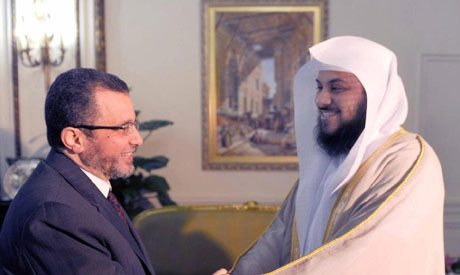 Prominent Saudi preacher Mohamed El-Areifi called during Friday prayers in Cairo's Amr Ibn El-Aas Mosque in Cairo for businessmen around the world to invest in Egypt, praising the country for its history and heritage.
Prominent Saudi preacher Mohamed El-Areifi called during Friday prayers in Cairo's Amr Ibn El-Aas Mosque in Cairo for businessmen around the world to invest in Egypt, praising the country for its history and heritage.El-Areifi particularly encouraged businessmen from the Arab Gulf region to invest in Egypt.
"Egypt is more worthy of our money than Germany or Switzerland ... The West may use our money in wars against us, but Egyptians are our people and more worthy of our money and our factories," he said.
In his speech in Egypt, El-Areifi also spoke against "those who seek strife in the country" and "those who use media to further strife," calling on Egyptians to work for the country's unity.
The renowned cleric spoke passionately of Egypt in an earlier speech given from his hometown in Saudi in December as the country was witnessing clashes between supporters of President Mohamed Morsi and opposition groups in front of the presidential palace.
The Saudi cleric's focus on the importance of Egypt as a country, and the influence it had on the Gulf region, gained him much popularity amongst many Egyptians.
However, El-Areifi's words on Egypt , as a prominent sheikh who also holds high positions within the kingdom, has also gained him much criticism from among the ranks of the Egyptian opposition who argue his speeches seek to give religious credibility to the ruling Muslim Brotherhood.
Other opposition figures took El-Areifi to task for his political stances within the Saudi kingdom.
"Thank you for supporting Egyptians, but we want you to tell the truth about the trial of women imprisoned in Riyadh, they are innocent women who are only seeking freedom … had you done that you would have been an example of an honest preacher," said Egyptian rights lawyer Gamal Eid.
On 4 January, a group of women were arrested by Saudi security forces for protesting the detention without charge of their relatives in the town of Buraida.
Well known Egyptian blogger Wael Abbas further criticised the prominent sheikh, referring to a religious edict the latter made after a woman asked his advice on what to do about her brother sexually harassing his own daughter. El-Areifi's answer to the woman was that young women should avoid wearing revealing or tight clothes in front of their fathers, so as not to seduce him.
"Naive people of Egypt, whoever gives a religious edict that blames the daughter's clothes if she was sexually harassed by her father is a sick cleric," said Abbas. Wael further accused El-Arefi of being a "delegate of the Saudi's intelligence that came to weigh the situation in fear of Iranian influence in Egypt."
Others came to El-Areifi's defence.
"If 10 per cent of what El-Areifi had said in his speech was said instead by a European president or American official, he would have been celebrated," said Salafist El-Nour Party leader Nader Bakkar.
"El-Oreifi has succeeded in one Friday sermon to fix what the media has been trying to spoil for the past two years," added Bakkar, referring to El-Areifi's encouragement of foreign investment in Egypt given the economic crisis the country is facing.
Egypt Prime Minister Hisham Kandil received El-Areifi Saturday, during which he thanked him for encouraging foreign investment in the country.
Born in Saudi Arabia in 1970, El-Areifi has a PhD in theology from the Islamic University of Imam Muhamed Bin Saud in Riyadh. He is now the preacher of Bawardi Mosque in southern Riyadh.
El-Areifi has worked as the religious instructor for Saudi Arabia's armed forces and Ministry of Defence. He later became a faculty member in the Islamic studies section of the Teachers' College in Riyadh.
El-Areifi is a member of the Ministry of Islamic Affairs in Saudi Arabia. He also offers religious consultation to Saudi Arabia's Public Security and Civil Defence forces, the Ministry of Defence and National Guard.


